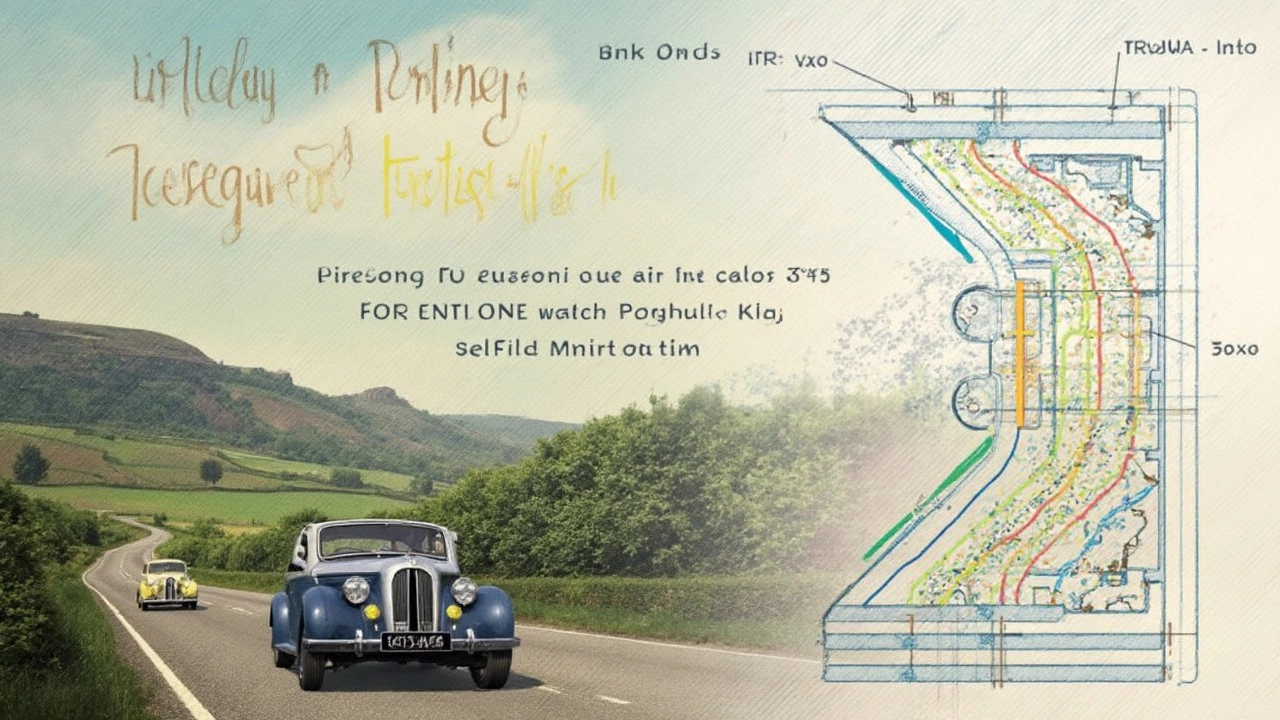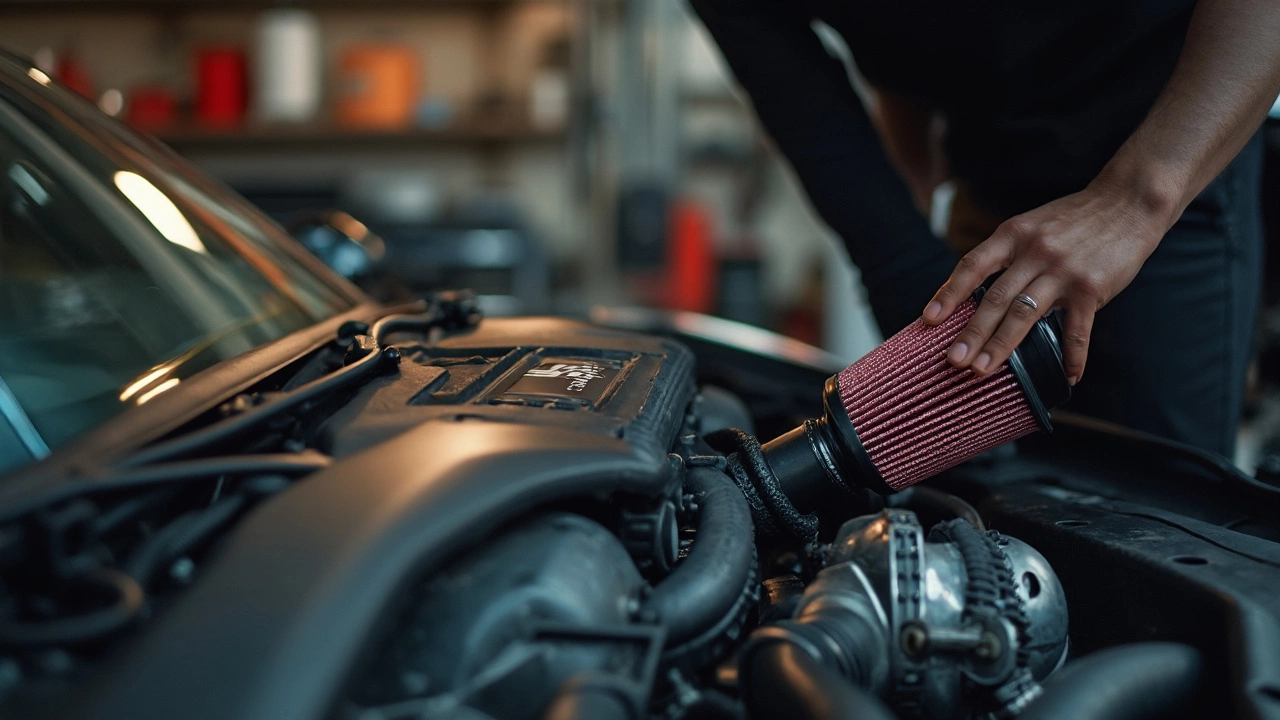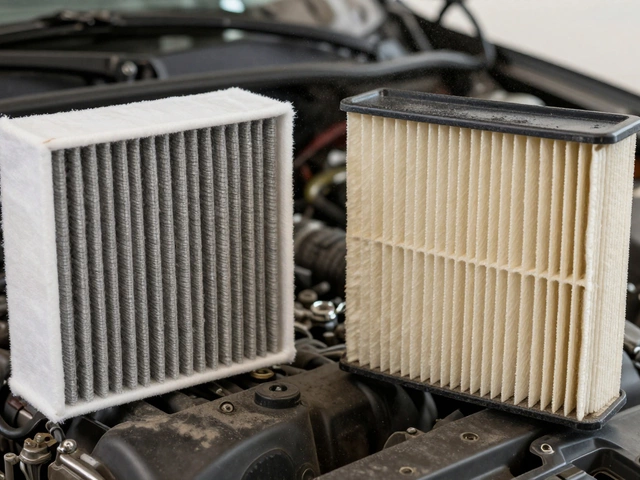Alright, car enthusiasts, let's talk about something that's been stirring up some chatter in the gearhead community: K&N air filters. You've probably heard folks singing their praises, claiming these babies can give your ride a bit of extra oomph. But what's the real deal here? Do they genuinely increase performance, or is it all smoke and mirrors?
First things first, what exactly are these filters? K&N is a brand known for making high-flow air filters that promise to boost engine performance by increasing air intake. But, you might be wondering, how does more air beef up your car's engine? Well, it all starts with the basic principle that more air, paired with the right amount of fuel, can lead to more power output.
But here's where it gets interesting. While more air sounds good on paper, the actual performance gains depend on several factors like your specific vehicle, the condition of your current air intake system, and driving habits. So, before you raid your bank account for an upgrade, it's worth looking into whether this change aligns with what you want to get out of your car.
- What are K&N Air Filters?
- How Do They Work?
- Impact on Performance
- Installation and Maintenance
- Are They Worth It?
What are K&N Air Filters?
Let's break this down: K&N Air Filters are pretty much legends in the world of aftermarket car parts. These guys are all about helping your engine breathe easier. Unlike traditional paper air filters, K&N filters are made from layers of cotton gauze sandwiched between aluminum wire mesh, soaked in a special oil.
Why does this matter? Because this design can improve airflow and keep nasty debris out of your engine bay. More clean air flowing through your engine can potentially lead to better combustion, which we're all hoping translates to improved performance. Think of it like this: when you're trying to sprint, you'd want to ditch a stuffy mask, right? Same idea for your engine.
But wait, there's more. One of the big draws of K&N filters is their reusability. Unlike conventional filters that you toss out every few months, these are reusable. Just give them a clean with the K&N filter cleaning kit, reapply the oil, and you're set. This could save you some cash in the long run.
If you're the numbers type, K&N claims their air filters can increase a vehicle’s horsepower by approximately 1 to 4 horsepower. However, take those numbers with a pinch of salt since actual gains can vary based on specific vehicle setups.
So, what’s the catch? While they offer better airflow, they might let in slightly more particulates compared to some high-grade paper filters. It's a balance between performance gains and a tiny bit of increased risk. For many, the performance air filters boost outweighs this downside.
How Do They Work?
So, you're curious about how K&N air filters actually do their thing? Let's break it down. These filters are all about letting your engine breathe better. You see, the more air that can get into your engine, the better it can do its job. Traditional air filters are made from paper and tend to be restrictive. This is where K&N comes in with their unique design.
K&N air filters are built with a cotton gauze material that's oiled up, allowing more air to flow through compared to those old-school paper filters. Think of it like this: imagine trying to sip a thick milkshake through a straw versus water. The thicker substance takes more effort. Traditional filters make your engine work harder for the air it needs because they trap smaller particles tightly, whereas K&N filters balance air intake with particle trapping thanks to the oiled cotton.
The oil on the cotton is key because it catches dirt and debris. Every time your engine sucks in air, some debris comes with it. But with the right balance of flow and filtration, K&N filters manage to snare the bad stuff without stifling the air your engine craves.
And there's more! These filters are washable and reusable, which is a big plus for those who don’t want to keep buying new ones. With the right care, a K&N filter can run up to 100,000 miles before cleaning. Talk about long-term savings! Just what's not often highlighted is that you do need to maintain them properly. You can't just slap one on and forget about it.
So, in a nutshell, performance air filters like K&N focus on increasing the volume of air getting to your engine by being less restrictive, while ensuring everything stays clean and debris-free. It’s like giving your car a big breath of fresh air, ready to boost performance when paired with the right conditions.

Impact on Performance
So, you've probably heard that installing a K&N air filter can add some pep to your vehicle. But what does that really mean for your car's performance? Let's break it down.
At the core, these filters are all about improving airflow. A typical stock filter can be restrictive, holding back your engine’s potential. K&N filters, on the other hand, are designed to reduce this restriction, allowing more air to rush in. More air means that more oxygen gets to the engine, which theoretically should help it burn fuel more efficiently and maybe even give you a bit of a horsepower bump.
But what kind of gains are we talking about here? Well, don’t expect a rocket ship transformation. The promised improvements are usually modest—think around 1 to 4 horsepower, depending on your vehicle's make and how it's currently configured. Yet, for a lot of folks, every bit counts, especially if you're looking to squeeze out all the performance you can get. And if you're into mods, a performance air filter can complement other upgrades nicely, like a new exhaust or custom tuning.
Now, here’s a tidbit—better airflow can sometimes enhance fuel efficiency. In theory, because the engine doesn’t have to work as hard to draw in air, it could lead to slight fuel savings over time. But again, don’t bank on massive changes to your gas bill.
Car performance isn't just about raw power, though. These filters can also contribute to a better throttle response—a more immediate feel when you step on the gas. This could make your drive feel smoother, especially if you enjoy a sporty dimension to your daily commutes.
However, it's essential to remember that results can vary significantly. Different cars react differently to changes in the air intake system. For a high-performance vehicle, the gains may be more noticeable. For others, it could be subtler. If you're curious about the specific benefits for your car, it could be helpful to chat with fellow enthusiasts or check out some online forums and reviews.
Here's a quick reality check—these filters work best when paired with other modifications. So, while a K&N filter alone might not turn your ride into a race car, it can be a worthwhile piece in the larger performance puzzle, especially if you're already planning other upgrades.
Installation and Maintenance
So, you've decided to give your car a little boost with a K&N air filter. Great choice! Now, let’s walk through how you can actually get that filter working in your ride. Trust me, you don’t need to be some kind of car wizard to handle this. It's pretty straightforward.
Installation is usually a breeze. Most K&N filters are designed to fit right into the existing air box, which means no need for special tools or mechanical wizardry. Here's a simple step-by-step guide:
- Pop the hood and locate the air box. It’s usually a plastic box near the engine with clips or screws holding it shut.
- Open it up by either unclipping or unscrewing, and you'll find your old filter inside. Take that old filter out and chuck it. You won't need it anymore.
- Check the air box for any debris or dirt. Clean it up if needed because a clean air box means a happy engine.
- Place the new K&N filter in the air box, making sure it’s seated properly. K&N filters often have a rubber seal to ensure a snug fit.
- Close the air box, secure it tightly with the clips or screws you removed, and you’re done. Simple, right?
Now, about maintenance. Unlike ordinary paper filters, K&N filters are reusable. You won't be throwing this one away after a dusty drive. Instead, you'll clean it, usually every 50,000 miles, depending on driving conditions. Here's how:
- Remove the filter from the air box just like you did during installation.
- Spray it with K&N’s cleaning solution, making sure to coat all the filter pleats. Let it soak for about 10 minutes to loosen up all the gunk.
- Rinse off the solution with water. Ensure you rinse from the clean side to avoid pushing dirt further into the filter.
- Let it dry completely. You might want to plan this when you don’t need to use your car for a bit, as it needs to air dry. No heat or blow dryers, please!
- Once dry, apply K&N filter oil. Don’t overdo it—just a light coat to keep everything running smoothly.
And there you go, your filter is ready to go back in and continue keeping your engine breathing easy. If you maintain it properly, a K&N air filter can last the life of your vehicle, saving you a bunch on replacements in the long run.

Are They Worth It?
So, you're probably wondering if investing in K&N air filters is a smart move for your car. While the idea of boosting performance and saving a bit on gas sounds tempting, whether it's worth it depends on a few things.
Let's start with performance. K&N claims their filters can increase horsepower by up to about 2-5%. Now, if your ride has around 200 horsepower, you're looking at an extra 4-10 horsepower. Not mind-blowing, but for some, every bit counts.
However, the real charm often lies in the long-term savings and convenience. K&N filters are designed to be reusable. Instead of buying a new disposable filter every so often, with regular cleaning, a K&N filter can last the lifetime of your vehicle. This might mean fewer trips to the auto parts store and a tad more cash in your pocket over time, especially since disposable filters can add up.
Let's talk about cost. While the initial price of a K&N filter is higher than regular filters, consider it an investment. If you're someone who hangs onto cars for the long haul, this can be a real money-saver.
That said, there are some variables. If you're just using your car for daily commutes and aren't really pushing it on highways or tracks, you might not notice a huge difference. Yet, if you're into mods and eager to squeeze every drop of performance from your machine, this could be a fun and practical upgrade.
You should also factor in the ease of maintenance. These filters require oiling and cleaning, which is straightforward but takes a bit of time. If you're up for a little weekend DIY, it could be a non-issue. But if not, factor that into your decision.
To wrap up, if you're seeking a modest performance bump and long-term savings on filter replacements, then, yeah, a K&N air filter might be worth the splash. Just make sure it fits with your driving habits and car care routine.






